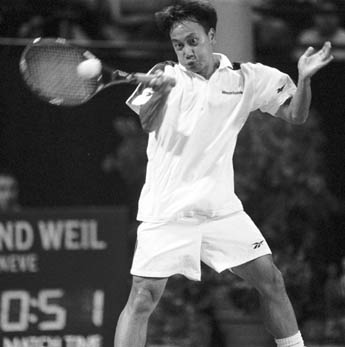I am no sports aficionado. I still don’t know what an inning is, I think football games are far too long, and golf terms like “bogey” make me giggle. Yet despite my ignorance, I am keenly aware of the fact that without a strong athletic department, UCLA wouldn’t be nearly as prestigious as it is today. That’s why I don’t mind letting our athletes retain priority enrollment.
Consider the Ivy League schools which had their humble beginnings in football. Only later did they become renowned strongholds of academic excellence. Sports, it seems, have unprecedented power in garnering widespread attention from the media and the general public; newspapers across the country devote several pages to sports, and not surprisingly, it’s among the most read sections.
They’re also good at procuring student attention. Second-year psychobiology student Neleam Said was influenced by UCLA’s athletic prestige when she decided to attend UCLA, even though she’s not an athlete.
“There’s a lot of great history with sports here, especially with basketball,” she said. “There’s a lot of pride.”
Athletic prowess can even tip the scales when a prospective student is making a difficult choice. Although UCSD’s engineering school is ranked higher, fourth-year aerospace engineering student Erik Li chose UCLA.
“I was originally 92 percent sure I was going to go to UCSD,” he said, but the lack of sports there changed his mind. “They don’t have a football team or a basketball team ““ and I thought that was sort of lame.”
Li also said he supports continued priority enrollment for athletes. “Since athletes work really hard to try to make the school proud by playing their hardest,” he said, “it would only be fair for them to have priority (for) classes and take ones that they think they could handle.”
I am by no means devaluing non-athletic time commitments. No doubt internships, jobs, clubs and band can be just as demanding and time-consuming as athletics. Unfortunately, however, these other activities don’t have the same clout that sports impart to an institution’s overall esteem.
And since sports are assumed to be a student-athlete’s primary preoccupation, practices cannot be rescheduled. Other activities are often more flexible and designed with student schedules in mind.
First-year sociology student and basketball player Atonye Nyingifa has been training four hours a day during basketball season and three hours during off-season. She said scheduling practices for team sports is difficult.
“Our coaches have to look at everybody’s classes to see what openings (there are) and what fits in,” Nyingifa said. She explained that during the season, coaches will allocate blocks of time for practice in advance. “Between 12 and 3 (p.m.), you can’t have any classes,” she said. Priority enrollment allows her to schedule classes that are in the early morning or late afternoon.
Moreover, there are about 700 student athletes at UCLA. I doubt 700 of the 26,536 undergraduates spread over various majors will have any impact on other students’ abilities to enroll in classes they want. What athletes do indisputably impact is UCLA’s reputation as a high-caliber bastion of excellence. For such a small population, they give quite a bang for your buck.
UCLA is unique because it wisely refuses to keep all its eggs in one basket: It is a public institution widely known as a powerhouse of both sports and academics. We have 103 NCAA championship titles, and at the 2004 Olympics in Athens, our students and alumni brought home more medals than any other university in the country.
UC Berkeley, though a top academic school, has a mere 26 NCAA titles ““ and Oklahoma State University, with 48 NCAA titles, is nowhere near as selective as UCLA, accepting 88 percent of its applicants.
In order to remain among the best-known universities internationally, UCLA must continue to attract a combination of top-notch athletes, students and faculty. Just as we do not allow the quality of our academics to suffer, we cannot allow our sports programs to falter, or force our athletes to compromise their performance. If we do, they will be hard-pressed to choose UCLA over other institutions. And if we stop winning NCAA championships, we will begin to lose some of our prominence as a school (already Stanford is close on our heels with just eight fewer titles than us).
In these difficult economic times, we cannot afford to forsake even an ounce of our competitive edge among other universities. If athletic acclaim lets us outshine other schools, then we ought to keep it that way. At least for now, once we’re under immense pressure to find good jobs, we can be assured that the weighty UCLA stamp will impress potential employers.
Letting athletes pick their classes first is a relatively small price to pay in order to attract the best athletes and students, as well as to sustain our university’s reputation and the advantage it brings us.
If fame and glory are your priority, e-mail Nijhawan at anijhawan@media.ucla.edu. Send general comments to viewpoint@media.ucla.edu.
